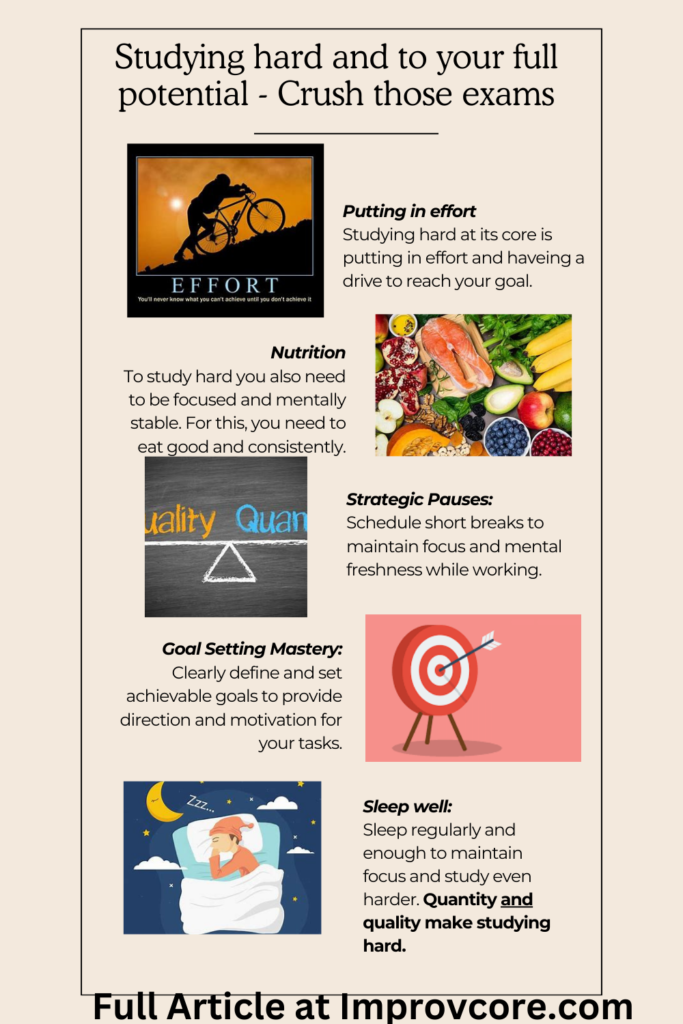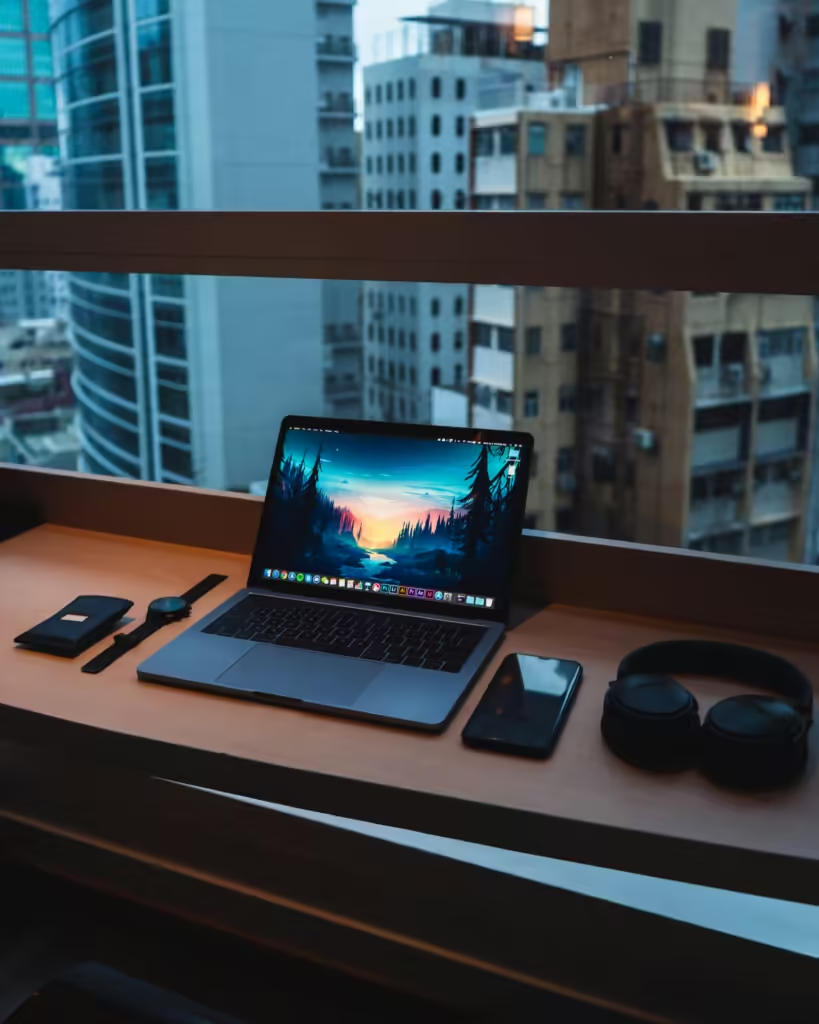Are you tired of pulling all-nighters and still feeling overwhelmed? It’s time to rethink your study approach. Studying hard isn’t just about putting in hours; it’s about smart, focused effort. Let’s debunk the myths and uncover the true meaning of effective studying. Imagine achieving your academic goals with ease while enjoying the learning process. Sounds impossible? It’s not! Let’s dive into the world of smart studying and unlock your full potential.
Understanding the Essence of Studying Hard
Define studying hard: More than just time investment
Studying hard, in its purest form, is putting all of your effort, focus and energy into concentrating and working towards your desired outcome.
Don’t think of studying hard as putting in 15 hours of studying. Sure, 15 hours of studying can be considered studying hard, but only if it is fully motivated and all of your energy and effort is going into it.
Another way to think of it, is that studying hard is fully focusing on the process and outcome, never losing focus of the task. Wanting it so bad, that you could do anything and work so unbelievably hard to get it.
The psychology behind effective learning
At improvcore.com, we believe that studying hard has 2 sides: effort/focus and efficiency. This could also be considered a combination of hard and smart studying,
If you have the drive and enthusiasm, great ½ done. Now, you must also make yourself build study habits that aid that effort, so it can pay off in the end.
Learning Types
Everyone learns differently, some learn through images, infographics, visuals. These people are called visual learners. Auditory learners learn best through music, discussion, lectures etc.
Kinesthetic learners learn best through practice, action or doing it in real life to build experience.
There are many more styles of learning, subsections and different versions.
Study Techniques
As you may know, there are many study techniques out there. You may have experimented with some and found that your motivated, driven study session was ruined when you tried a certain study method.
The best are mental imagery, mnemonics, testing and distributed practice.
In short, those are all the ones you need, avoid highlighting and rereading as they will make your effort and hard studying become ineffective studying that makes you feel productive but not actually productive,
Balancing quantity and quality of study time
Study quality and quantity are both essential for studying hard. As said before, studying 12 hours isn’t studying hard unless you make it count
Make sure your study sessions are adequate length by accurately calculating how much time you really need for the outcome. For example, for a small end of topic exam, you do not need to waste your time studying 10 hours. Just study 2-3 hours and spend the rest of your time doing things that actually matter to you.
If it is a final exam then you may need to study 10 or more hours per day, but it is in these cases, where quality really shows itself.
To study with quality, you need to space out your learning, take breaks and do not go 3 hours straight with no breaks, because I guarantee you will get distracted.
Another aspect of quality studying is being fully focused, no distractions. Remove all distractions and be fully immersed into the task at hand.
Studying with quality also means using the correct revision styles and techniques for you personally. As said earlier, don’t go listening to a song about a topic if you hate music or forget everything after 2 seconds. Additionally, don’t go wasting your 10 hour study sessions rereading chapters in a textbook.
Quality and quantity should be together, always!
Building a Solid Study Foundation
Creating a conducive study environment
Building a good study environment can allow you to study hard, very hard if you do it right.
Remove distractions and things you know you will think about, put your phone in another room and set a calm, focused mood in your place.
For more tips on creating a solid study environment, visit our article.
Time management techniques for optimal productivity
Make sure to organise time efficiently to make your drive and effort in your hard studying worth it.
Create a routine and plan your study sessions in advance with what, when and how you will study.
For more on time management tips visit our article.
Overcoming procrastination
Gaining discipline is a valuable skill, especially as a teenager and student. Build momentum with discipline to overcome procrastination. Future articles will be made on this so don’t miss out!
Effective Study Methods and Strategies
Active recall techniques for better retention
- Flashcards – More details and articles will be made soon!
- Teach others – More details and articles will be made soon!
- Do quizzes, questions and tests – More details and articles will come out soon!
- Try blurting – More details and articles will come out soon!
Power of Spaced Repetition
Spaced repetition is a simple yet proven powerful method for learning anything, some of its benefits include:
- Improved long term memory
- Knowledge goes deeper
- More efficient
Future articles will be made on this, but for more information visit https://www.bcu.ac.uk/exams-and-revision/best-ways-to-revise/spaced-repetition .
Combining different study methods for maximum impact
Try different study methods, but since there are so many, don’t try them all at the same time. Before your next exam, pick 1-3 methods that fit for the occasion and subject. Try the methods and repeat this process again and again.
After a while you will have a list of solid, maximum impact study methods that work for you, you may also have build a system or routine.
Taking Care of Yourself for Optimal Learning
The importance of physical and mental well-being
In those long and hard study sessions, don’t forget to rest and do an adequate amount of exercise.
More importantly, do not forget to sleep at least 7 hours. Sleep is vital and to improve sleep you need to:
- Reduce light before bed
- Sleep at around 18 degrees celsius(16 degrees fahrenheit)
- Sleep according to your chronotype
- Sleep regularly and wake up regularly
Sleep plays a crucial role in memory and attention, for more on sleeps impact and how to optimise it. Visit these links:https://www.healthline.com/nutrition/17-tips-to-sleep-better or https://www.youtube.com/watch?v=hvPGfcAgk9Y .
Nutrition and exercise for brainpower
Exercise, such as cardio and resistance training has been shown to improve sleep and reduce stress and anxiety. Keeping healthy should not be understated.
Eat regularly and avoid junk food as it will cause brain fog and distract you.
Managing stress and anxiety
Stress and anxiety are normal, try meditation and improving sleep. If you study hard and smart, you will feel more confident
Measuring and Improving Your Study Habits
Setting clear learning objectives
Setting goals is vital and setting SMART goals even more so. If you have solid goals, your hard study sessions will pay off.
Create goals regularly by creating a routine/system in a journal or notion doc. Create Specific, Measurable, Achievable, Relevant and Timely goals.
Tracking your progress and identifying areas for improvement
Track your progress with your goals or by writing what you got done in what time not only to track how you are doing and improving but also to understand how to improve your work methods.
Seeking feedback and support
Ask teachers and parents, this counts as hard work too. If talking to them is hard, well then you’re really working hard, and smart.
Conclusion
Studying hard doesn’t have to be a dreaded chore. By understanding the principles of effective learning and implementing practical strategies, you can transform your study sessions into productive and enjoyable experiences. Remember, it’s not about how many hours you spend but how effectively you utilise your time. So, take control of your learning journey, embrace new study techniques, and watch your academic success soar!
Study hard, the best way!
Below is a Pinterest post on what was covered. Join our pinterest here.

